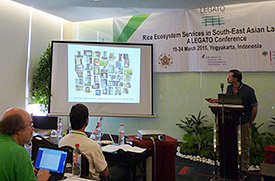Press release from 19 March 2015
LEGATO annual conference: Rice ecosystem services in South-East Asian landscapes
The international project LEGATO (Land-use intensity and Ecological Engineering - Assessment Tools for risks and Opportunities in irrigated rice based production systems) is organizing its 4th annual conference, entitled "Rice Ecosystem Services in South-East Asian Landscapes - a LEGATO conference" which lasts from 19-24 March 2015 in Yogyakarta, Indonesia.

LEGATO conference in Yogyakarta, Indonesia, 19-24 March 2015.
The conference will bring together experts from 21 research institutions from Germany, Vietnam, The Philippines, UK, Bulgaria and Spain to discuss and present state of the art of research, the main LEGATO results, and future research plans and ambitions. The main topics discussed will include:
- evaluation of ecosystem functions and services based on project data
- exploring various climate, land-use, and management conditions for sustainable rice ecosystem services
- the relevance of biocontrol for pest management
- silicon (Si) as a beneficial element for rice plants
In a world facing the challenges of growing population and food deficit, there is a clear need for crop productivity increases. Optimising rice ecosystem functions and services in Southeast Asia and their stabilisation under future land use and climate change, is the main focus of LEGATO.
"After 4 years of research within LEGATO we now have reached a stage of increasing integration, but especially also a stage of outreach of our results for application in South-East Asian rice landscapes, especially the contra-intuitive reduction of rice pest problems by avoiding the use of insecticdes." explains project co-ordinator Prof Josef Settele, Center for Environmental Research – UFZ, Germany.
Further informationen:
PD Dr. Josef Settele
Department of Community Ecology
PD Dr. Josef Settele
or via
UFZ press office
Tilo Arnhold, Susanne Hufe
Phone: +49-(0)341-235-1635, -1630
In the Helmholtz Centre for Environmental Research (UFZ), scientists conduct research into the causes and consequences of far-reaching environmental changes. Their areas of study cover water resources, biodiversity, the consequences of climate change and possible adaptation strategies, environmental technologies and biotechnologies, bio-energy, the effects of chemicals in the environment and the way they influence health, modelling and social-scientific issues. Its guiding principle: Our research contributes to the sustainable use of natural resources and helps to provide long-term protection for these vital assets in the face of global change. The UFZ employs more than 1,100 staff at its sites in Leipzig, Halle and Magdeburg. It is funded by the federal government, Saxony and Saxony-Anhalt.
The Helmholtz Association contributes to solving major and urgent issues in society, science and industry through scientific excellence in six research areas: Energy, earth and environment, health, key technologies, structure of matter as well as aviation, aerospace and transportation. The Helmholtz Association is the largest scientific organisation in Germany, with 35,000 employees in 18 research centres and an annual budget of around €3.8 billion. Its work is carried out in the tradition of the great natural scientist Hermann von Helmholtz (1821-1894).
